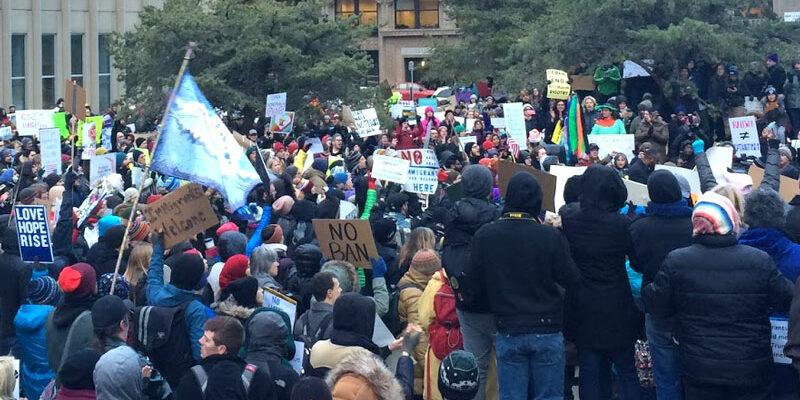Creating the Beloved Community: Prophetic Imagination in Resistance of the Muslim Ban
Abigail Hindson is the Communications Intern at MNIPL. Originally from La Crosse, WI, Abigail graduated from Lawrence University in 2016 and recently moved to Minneapolis. She enjoys running around the lakes, growing vegetables in a community garden, and making new roots through First Universalist Church and the Contact Improvisation dance community.
I arrived at the demonstration opposing President Donald Trump’s executive order on travel from seven majority-Muslim countries (read: Muslim Ban) at Minneapolis International Airport, and a woman in a white headscarf approached me with tears in her eyes. In the following seconds, she gave me three irreplaceable gifts: a loving but burdened smile, a compassionate hug, and the most meaningful “thank you” that I have ever received. All around me I saw similar stories unfolding. Laughter, hugs, kind words, and bursts of song erupted in unexpected, abundant blooms throughout the crowd. And I thought, this is what prophetic imagination looks like.
At my parish, First Universalist Church, February’s worship theme is “Prophetic Imagination”. At its core is an idea Rev. Ruth MacKenzie outlines: “the prophet is one who sees the patterns hidden in plain sight. Her measuring stick is not consumer indexes, but the health and well-being of the whole.”

As I stood there in the terminal I knew that this is exactly where I am called to be and that this is what I’m called to do in this moment: to be fully present in body, mind, and spirit. In this presence, I recognize that as an employed, college-educated white woman my story is not the one to be told right now. I must listen, be present in body, and use my voice to amplify those stories vital to the vibrant community we see through prophetic imagination.
It is by engaging in prophetic imagination that we can create “beloved community”. Civil rights activist, Freedom Rider, and U.S. Congressman John Lewis says of this idea:
“you have to have this sense of faith that what you’re moving toward is already done. It’s already happened…you live as if you’re already there, that you’re already in that community, part of that sense of one family, one house. If you visualize it, if you can even have faith that it’s there, for you it is already there. And during the early days of the [civil rights] movement, I believed that the only true and real integration for that sense of the beloved community existed within the movement itself.”

One speaker invoked the necessity to remember that the United States is a nation built upon white supremacy, the enslavement and murder of black and brown peoples, broken treaties and centuries oppressive legislation that diminishes the voices of the marginalized and vulnerable. Where is “beloved community” in this history? I believe that it is present in the dreams of those who resisted wholeheartedly. And it is present now in our budding vision for an inclusive present and a prophetic notion that a future beloved community will materialize with our work. What if we dare to imagine this beloved community in ourselves?
I see beloved community in the tears and hugs shared between total strangers outside Minneapolis International Airport on Sunday.
I see beloved community in two young Muslim women praying on the sidewalk as demonstrators wove their way through stopped traffic on Hennepin Avenue Tuesday evening.
I see beloved community in the smiles passed around unconditionally at these gatherings.
I see beloved community in the children who come with their parents to chant “This is what democracy looks like.”
But what I see most powerfully is that we Minnesotans know NOW that “All are welcome here.”
The past few weeks have shown that everything we hold dear in the United States–from the complex intercultural and interfaith fabric that weaves us together, to the wide, wild places we hope to preserve from oil and gas exploitation–is under attack. At Minnesota Interfaith Power and Light we know that Islamophobia is as much a threat to the beloved community we envision as climate change. We affirm Dr. Martin Luther King Junior’s notion that “injustice anywhere is a threat to justice everywhere.” This means we must create a truly intersectional movement,
with climate advocates showing up for actions on the Muslim Ban; white people showing up for Black Lives Matter; men showing up for women’s marches.
Our greatest calling in this moment is to love each other, to listen deeply, to act with moral courage, and to walk hand in hand in the “beloved community” we’re forming day by day. This movement must be centered around those whose voices are most marginalized, around the stories of those who have the most at stake. If we cannot center our movement around these people–refugees, immigrants, black, brown, trans, queer and disabled bodies and women (especially women of color)–it will fail. And we must do this with the clarity of what activist, academic, and artist Lilla Watson has said: “If you have come here to help me, you are wasting your time. But if you have come because your liberation is bound up with mine, then let us work together.”
I will stand beside you. We will work together to build beloved community. We are the ones we have been waiting for.

